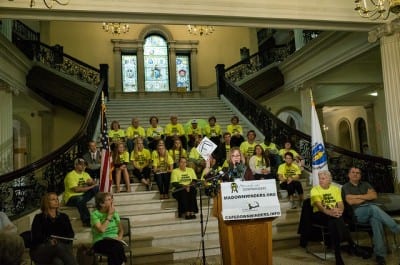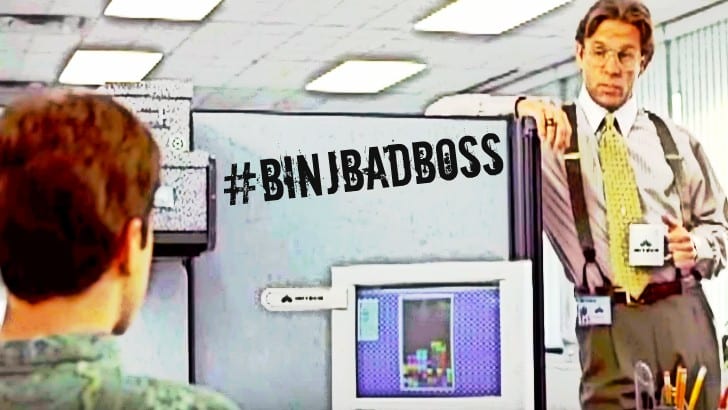Image by Kent Buckley
October 26, 2015
BY JASON PRAMAS @JASONPRAMAS
About 50 people—most from the South Shore and Cape Cod—held a protest rally last Thursday at the Grand Staircase in the Massachusetts State House to demand the immediate closure of the Pilgrim Nuclear Power Station on a long list of public safety grounds. This in the wake of the facility’s owner, Entergy Corp., announcing it will shutter the plant by 2019 because it’s become too expensive to run.
The demonstrators, led by the several grassroots groups that comprise the Pilgrim Coalition, say that’s an improvement from the 2012 decision, by the industry-friendly Nuclear Regulatory Commission, to allow the plant to remain open until 2032. But every minute that Pilgrim remains open increases the possibility that some calamity could render large swaths of the Bay State radioactive for thousands of years.
It was the kind of event that left me thinking, “We need 50,000 people here, and another 50,000 people surrounding Pilgrim until Entergy shuts it down.” So great is the existential crisis of such a dangerous and aging nuclear reactor being allowed to continue operating far closer to Boston than the now-infamous Fukushima Daiichi nukes are to Tokyo.

Photo by Jason Pramas
Seriously, the Fukushima plant is 141 miles from Tokyo. Pilgrim is only 38 miles from the State House—well within the 50-plus mile distance of the furthest communities that ended up being contaminated by the radioactive plume from Fukushima.
In early 2014, Gov. Deval Patrick confirmed what area activists had been saying for years: there is no viable evacuation plan in the event of a disaster at Pilgrim. Many people living in areas affected by releases of radiation would essentially be told to “shelter in place” by Entergy and the Mass. Emergency Management Association. At the time, Patrick asked the NRC to step in and to close the plant if it failed to comply with regulations. Later that year, the NRC kicked the responsibility for developing real plans back to Patrick. In short: there is still no evacuation plan for communities near the plant, let alone for Boston.
As the protesters pointed out last week, following the 2011 meltdown at Fukushima, the NRC told Americans who were living and working within 50 miles of the plant to evacuate. Given that there are no evacuation plans for the less densely populated communities near Pilgrim, what exactly would we do in Boston if Pilgrim were to suffer a similar disaster? No responsible party has an answer to that very obvious question.
To make matters worse, the Pilgrim nuke is a General Electric Mark I type. Exactly the same type as five of the six reactors at Fukushima Daiichi—including all four of the reactors that suffered catastrophic failures in 2011. Like Fukushima, Pilgrim is situated right on the ocean, and is therefore susceptible to damage from the kinds of super-hurricanes and massive winter Nor’easters that are expected to hit the Massachusetts coast with increasing frequency in the coming decades due to global warming—much like how Fukushima was hit by a tsunami caused by a powerful earthquake.
Pilgrim has already had numerous safety violations over the years—some of which, as with Fukushima, were not properly reported until recently. Nevertheless, the NRC has repeatedly downgraded the safety rating of the plant due to such problems, making it one of the lowest rated plants in the country.
Given these facts, the only sensible thing to do is to shut the plant down immediately. So I join the protestors in calling for Gov. Charlie Baker and the legislature to take all appropriate actions necessary to make that happen now, and for Entergy to think about more than just its bottom line. Rally speakers Sen. Dan Wolf and Sen. Kathleen O’Connor Ives can be looked to for legislative leadership in this fight, though it won’t be their last. Seabrook is only 39 miles from the State House and has similar problems, but that’s a column for another day.
Readers interested in getting involved in this critical campaign can check out the Pilgrim Coalition website.
Apparent Horizon is syndicated by the Boston Institute for Nonprofit Journalism. Jason Pramas is BINJ network director.
Copyright 2015 Jason Pramas. Licensed for use by the Boston Institute for Nonprofit Journalism and media outlets in its network.




